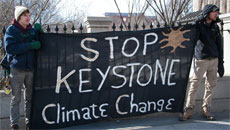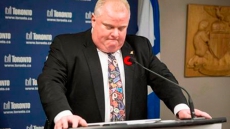OTTAWA — Doubling the children's fitness tax credit. Check.
Income splitting for couples with kids. Check.
The Conservative government has been ticking off boxes recently beside its list of multibillion-dollar, family-friendly promises made during the 2011 election campaign, pledges contingent on a balanced budget.
With a smaller-than-expected surplus forecast for next year, the Tories still have outstanding commitments to fulfil before the 2015 election, such as an adult fitness tax credit and a plan to double the annual limit on tax-free savings accounts.
The situation raises a question: Is there enough cash in federal coffers for the Conservatives to make good on these promises in time for the scheduled October vote?
Budget watchers believe there's space left for the measures in next year's $1.9-billion projected surplus, even though it was reduced by the recent drop in oil prices and the government's commitment of billions of dollars for the family measures.
"The tax cuts basically eliminated about half the projected surpluses and lower oil prices took out a chunk as well — but the projections that the Department of Finance put together are quite prudent," said Scott Clark, a Carleton University professor and former senior Finance Department bureaucrat.
In their 2011 platform, the Conservatives projected the adult-fitness tax credit, a plan that would cover up to $500 in fitness registration fees, to cost $69 million in its first year and $275 million the following year.
The Tories' platform listed the expected cost of its TFSA expansion at $7.5 million in the first year and $30 million in the second year of implementation. The proposal calls for the annual TFSA contribution limit to increase to $10,000 per year.
Finance Department figures have estimated TFSAs reduced Ottawa's revenues by $65 million in 2009, $165 million in 2010 and $160 million in 2011. The government has projected the fiscal burden of TFSAs to rise to $295 million in 2012 and $410 million in 2013.
If the promised limit increase is implemented, Clark said the biggest impact of the TFSA plan would only affect public finances years — or even decades — down the road. The first few years would not be a large burden for the government, he added.
"You don't get a tax deduction when you put money into it; the tax break comes when you take money out of it," he said.
"So, it's a nice deal for them (the Conservatives). They can make the announcement and let someone else worry about it 20 years from now."
Finn Poschmann of the C.D. Howe Institute supports the TFSA plan, but he said the government cannot ignore the potential long-term fiscal implications of a limit increase.

Poschmann believes the government has enough leftover cash to pay for its additional campaign pledges, and he expects it to follow through.
"It's a political approach that has served this government well," he said.
Last month, Prime Minister Stephen Harper dropped strong hints his government would live up to all of its 2011 promises, as he introduced a package of cost-saving initiatives aimed at families.
"We're doing this in a way that assures that the things we promised in the last election will actually reach people in the life of this Parliament," Harper told reporters after announcing an income-splitting plan, which is expected to cost around $2 billion annually over the next six years.
"So, we're doing both things. We're balancing the budget in the life of this Parliament and we're making sure people benefit from the promises we made in the life of this Parliament."
When asked about the TFSA expansion pledge, Harper replied he was well aware of that promise.
"I think we've now fulfilled something like 90 per cent of the commitments we made in the platform in the last election and I know we look forward to the budget in the spring of 2015, so stay tuned for that," he said.
Calculations by TD Economics suggest the adult fitness tax credit would cost $200 million per year, while the TFSA increase would use up $300 million in 2015-16 and between $400 million and $600 million over the following four years.
In a research note released after last week's fall fiscal economic update by the government, TD Economics predicted Ottawa would still be able to pay for the new measures, but that little room would remain for any new spending.
Ottawa's update also showed how the balance of the government's employment insurance operating account will continue grow by nearly $4 billion per year until the end of 2016-17.
Clark said the extra cash from higher-than-necessary EI rates has essentially paid for the recent measures for families and allowed the government to achieve a surplus next year.
"In other words, the only reason why they're still in surplus is because of the EI premium rate generating that revenue," he said.





